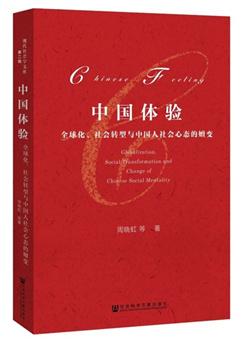Complete Chinese experience with spiritual values
Author : ZHOU XIAOHONG Source : Chinese Social Sciences Today 2017-06-12

Chinese Feeling: Globalization, Social Transformation and the Change in the Chinese Social Mentality
Author: Zhou Xiaohong et al.
Publisher: Social Sciences Academic Press (China)
Since the term “Chinese feeling” popped up in 2009, I have been expecting to write a book on it and to draw attention to the changes taking place in Chinese people’s value system and the general public mentality. In my work Chinese Feeling, I attempted to illustrate how to define the relationships that connect the individual with the country and globalization, and how to conform while creating trends, against the background that Chinese people are experiencing drastic social transformation, institutional reform, economic development and ideological changes through unqualifiable concepts, such as emotions, mentality and feeling. In general, the public feeling towards society is difficult to measure, but there are still laws to be discovered. In the meantime, the feeling also promotes social development, especially people’s consciousness of rights, values and the new behavior of public opinion.
Since 1978, the reform and opening up policy has brought Chinese society unprecedented progress, assuring the world’s second-largest economy steady steps toward becoming a modernized country. To be more specific, remarkable changes of the past three decades have also transformed Chinese people’s value system, life attitude and social behavior. Like structural transformation of society, Chinese people’s feeling and cognition of the society has changed in a profound and extensive way. In this sense, we could regard the big transformation as a part of the “Chinese experience,” or we can just call it the “Chinese feeling.” It is Chinese people’s subjective feeling and psychological growth brought by reform and opening up since 1978, which completes the Chinese experience with spiritual values.
Research on Chinese feeling should also be set against the backdrops of globalization and Chinese social transformation, otherwise it would be hard for us to acquire the sociological imagination put forth by American sociologist Charles Mills. If Mill’s thesis is true, that individuals could only understand their experience and master their own fate by casting themselves in the times they belong, and that one could know his or her own life opportunities only by first acknowledging everybody else’s life opportunities in his or her time, then we must not ignore the huge transition brought by globalization and social transformation in the past three decades when we try to interpret the changes in Chinese people’s spiritual world and inner feeling. For this, we could at least understand and elaborate on the theoretical and practical significance of “Chinese feeling” from the following two aspects:
First, the rapidity and extensiveness of Chinese social transformation indeed offers enormous potential for research on Chinese feelings and experience to make contributions to social sciences. In terms of our study, we could contribute our share by figuring out the values of human behavior research in uniqueness and universality via studying the Chinese feeling. Second, the over 30 years of transformation is irreversible. Therefore, we must record the impact of the transformation on Chinese people’s values system and the public psychology and take it as a sign of the maturing of the spiritual world of our nation.
Ye Shengtao made Chinese fairy tales from a wilderness
Ye Shengtao (1894–1988) created the first collection of fairy tales in the history of Chinese children’s literature...
-
How northern ethnicities integrated into Chinese nation
2023-09-18
-
Mogao caves
2023-09-12
-
Mogao Grottoes as ‘a place of pilgrimage’
2023-09-12
-
Time-honored architectural traditions in China
2023-08-29
-
Disentangling the civilizational evolution of China
2023-08-28
-
AI ethics in science fiction
2023-08-23














 2011-2013 by www.cssn.cn. All Rights Reserved
2011-2013 by www.cssn.cn. All Rights Reserved